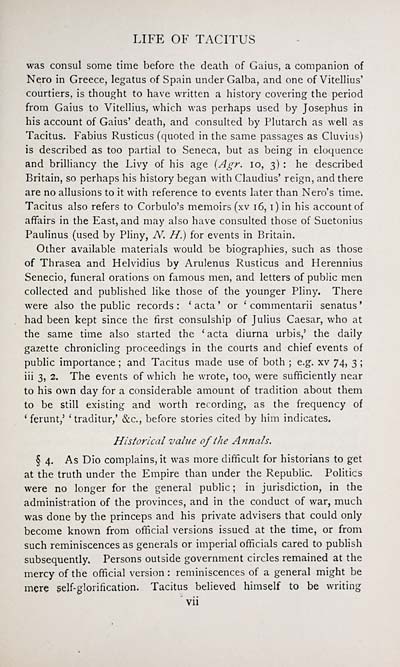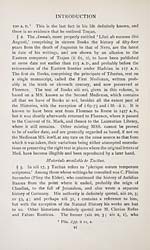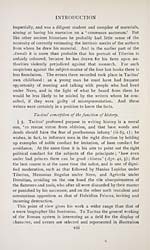Download files
Complete book:
Individual page:
Thumbnail gallery: Grid view | List view

LIFE OF TACITUS
was consul some time before the death of Gaius, a companion of
Nero in Greece, legatus of Spain under Galba, and one of Vitellius'
courtiers, is thought to have written a history covering the period
from Gaius to ViteUius, which was perhaps used by Josephus in
his account of Gaius' death, and consulted by Plutarch as well as
Tacitus. Fabius Rusticus (quoted in the same passages as Cluvius)
is described as too partial to Seneca, but as being in eloquence
and brilliancy the Livy of his age {A^r. lo, 3) : he described
Britain, so perhaps his history began with Claudius' reign, and there
are no allusions to it with reference to events later than Nero's time.
Tacitus also refers to Corbulo's memoirs (xv 16, i) in his account of
affairs in the East, and may also have consulted those of Suetonius
Paulinas (used by Pliny, A''. N.) for events in Britain.
Other available materials would be biographies, such as those
of Thrasea and Helvidius by Arulenus Rusticus and Herennius
Senecio, funeral orations on famous men, and letters of public men
collected and published like those of the younger Pliny. There
were also the public records : ' acta ' or ' commentarii senatus '
had been kept since the first consulship of Julius Caesar, who at
the same time also started the 'acta diurna urbis,' the daily
gazette chronicling proceedings in the courts and chief events of
public importance ; and Tacitus made use of both ; e.g. xv 74, 3 ;
iii 3, 2, The events of which he wrote, too, were sufficiently near
to his own day for a considerable amount of tradition about them
to be still existing and worth recording, as the frequency of
' ferunt,' 'traditur,' Sec, before stories cited by him indicates.
Historical value of the Atifials.
§ 4. As Dio complains, it was more difficult for historians to get
at the truth under the Empire than under the Republic. Politics
were no longer for the general public ; in jurisdiction, in the
administration of the provinces, and in the conduct of war, much
was done by the princeps and his private advisers that could only
become known from official versions issued at the time, or from
such reminiscences as generals or imperial officials cared to publish
subsequently. Persons outside government circles remained at the
mercy of the official version : reminiscences of a general might be
mere gelf-glorification. Tacitus believed himself to be writing
' vii
was consul some time before the death of Gaius, a companion of
Nero in Greece, legatus of Spain under Galba, and one of Vitellius'
courtiers, is thought to have written a history covering the period
from Gaius to ViteUius, which was perhaps used by Josephus in
his account of Gaius' death, and consulted by Plutarch as well as
Tacitus. Fabius Rusticus (quoted in the same passages as Cluvius)
is described as too partial to Seneca, but as being in eloquence
and brilliancy the Livy of his age {A^r. lo, 3) : he described
Britain, so perhaps his history began with Claudius' reign, and there
are no allusions to it with reference to events later than Nero's time.
Tacitus also refers to Corbulo's memoirs (xv 16, i) in his account of
affairs in the East, and may also have consulted those of Suetonius
Paulinas (used by Pliny, A''. N.) for events in Britain.
Other available materials would be biographies, such as those
of Thrasea and Helvidius by Arulenus Rusticus and Herennius
Senecio, funeral orations on famous men, and letters of public men
collected and published like those of the younger Pliny. There
were also the public records : ' acta ' or ' commentarii senatus '
had been kept since the first consulship of Julius Caesar, who at
the same time also started the 'acta diurna urbis,' the daily
gazette chronicling proceedings in the courts and chief events of
public importance ; and Tacitus made use of both ; e.g. xv 74, 3 ;
iii 3, 2, The events of which he wrote, too, were sufficiently near
to his own day for a considerable amount of tradition about them
to be still existing and worth recording, as the frequency of
' ferunt,' 'traditur,' Sec, before stories cited by him indicates.
Historical value of the Atifials.
§ 4. As Dio complains, it was more difficult for historians to get
at the truth under the Empire than under the Republic. Politics
were no longer for the general public ; in jurisdiction, in the
administration of the provinces, and in the conduct of war, much
was done by the princeps and his private advisers that could only
become known from official versions issued at the time, or from
such reminiscences as generals or imperial officials cared to publish
subsequently. Persons outside government circles remained at the
mercy of the official version : reminiscences of a general might be
mere gelf-glorification. Tacitus believed himself to be writing
' vii
Set display mode to: Large image | Transcription
Images and transcriptions on this page, including medium image downloads, may be used under the Creative Commons Attribution 4.0 International Licence unless otherwise stated. ![]()
| Early Gaelic Book Collections > Matheson Collection > Cornelli Taciti annalium > (11) |
|---|
| Permanent URL | https://digital.nls.uk/76567076 |
|---|
| Description | Items from a collection of 170 volumes relating to Gaelic matters. Mainly philological works in the Celtic and some non-Celtic languages. Some books extensively annotated by Angus Matheson, the first Professor of Celtic at Glasgow University. |
|---|
| Description | Selected items from five 'Special and Named Printed Collections'. Includes books in Gaelic and other Celtic languages, works about the Gaels, their languages, literature, culture and history. |
|---|

